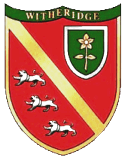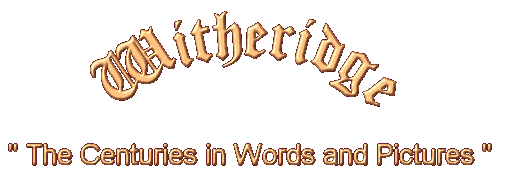

|
In the 1933 Carnival there was a horse-drawn wagon, on which the Witheridge Melody Makers played, as Gordon Reed led the horse along the processional route. The musicians were Messrs C Pickard, F Hitchcock, F Kingdom, A Brent, and F W Kingdom. At the end of the 1930's music at dances was often played by the local Rhythm Songsters Band. This included Min Blackford on piano, Frank Kingdom on drums, Bill Blackford on accordion and alto sax, and a vocalist Joan Nott. They played a range of music from modern to such traditional items as the Lancers, the Gay Gordons, the Barn Dance, Valeta and St Bernard's Waltz. In the 1950's dance music really took off in Witheridge. It is the memories of John Bryant that throw light on this period and the years after. About 1954 the Blue Birds were formed by Digger Ford, John Bryant and Cyril Blackford. Later they were joined by Terry Cottrell, and later still by Stan Beer. They began in Chulmleigh Town all but soon had other engagements including Witheridge itself. Among them were Hunt Balls at Winsford, Exford and Hawkridge. For transport they used Joe Churchill's car and Digger's 1938 Austin 12, and John's Austin 7 when he reached the age of 17 and could drive. John left the Blue Birds in 1958 to do his military service and was replaced by Peter Boax. The band went on into the 1970's and became The Barracuders.
In the 1960's John Bryant started The Hot Spots with Fred Davey and Jeff Stevens. Among their first engagements were sing-alongs at the Gidleigh Arms, but they soon moved on to dances, including those in the Angel Room. Terry Cottrell joined them from the Blue Birds, and they began playing for Young Farmers Dances and Hunt Balls, which quickly got them more widely known. Next to join was Tony Harper, a drummer from London, whose father was drummer for Ted Heath's Band. It was Tony who taught Keith Gowan the drums. Later there was Johnny Walker, singer and guitarist, and Bob Jarvis, a bass player from Sidmouth. Costs were high. John's accordion in the 1960's cost nearly £200; the Public Address System was £600, and the instruments in all accounted for £1000. Most of the money received went to meet the instalments due on the equipment, and yet, when someone tipped off the Inland Revenue, they had to find 6 years back tax. The reputation of The Hot Spots grew, and soon bookings were coming from as far away as, Cornwall, Dorset, Bristol, Birmingham, the Rhonda Valley, were played and yet they always returned home the same night, four in the morning was not unknown. Fortunately Keith Gowan's van could take six players and their gear. They could play any kind of music required for the age group. Although killed in the war, Glenn Miller's style was still very popular. There were times when they played as back up to the likes of Akker Bilk and The Searchers. Their own favourite music was Rock 'n Roll and Latin American - samba, cha-cha, rumba, tango. SOUTH MOLTON GAZETTE 11TH APRIL 1939: Considerable interest was taken in a crooning competition, which was held at The Angel on Tuesday. The spacious ballroom resembled a radio studio during an amateurs hour. There were several entrants who accepted the band's invitation to "mike" a name (or noise) for themselves. A Witheridge entrant, Mr Les Bourne, came second with "Mother Nature's Lullaby". In 1974 John left The Hot Spots and started Something Different with Mike Herniman on drums and Doug Parish on bass guitar. They started at The Stag in Rackenford and were soon getting Club bookings in places such as Exeter, Exmouth and Sidmouth. They became members of the Musicians Union and Equity, as this was a pre-condition of a Club booking. In 1978 John teamed up with Frank Cregan as the F and J Duo. Frank sang and John was on organ. They were averaging one or two bookings a week until 1990, when an accident brought the duo to an end. March 2nd 1889 - Witheridge Music Society: The local celebrity which the Society has attained on account of the popularity and general excellence of its performance was the means of drawing a large concourse of people to the National Schoolroom on Friday evening last week to witness the closing entertainment of the season. The platform, prettily decorated by Miss French and Mrs Llewellyn, presented a very gay appearance. Dr Haydon occupied the chair. The Committee, Messrs Cornish, Mansfield and Pullen had carefully arranged the programme with a view to gratifying the varied tastes of a mixed audience, and the hearty and enthusiastic reception, which greeted its several items, testified to the fact that the object had been attained. Parts one and two of the programme were each opened by the Witheridge Subscription brass band, who acquitted themselves capitally, thereby reflecting great credit upon their efficient and painstaking leader, Mr S Hill. Mr G Selley presided at the pianoforte as accompanist. The part-singing bore ample evidence of the care that had bestowed upon its preparation, the expression, precision and spirit, which characterised it calling forth most flattering remarks. The ladies solos, which were mainly of a sentimental character, were sung with considerable taste and feeling and evoked spontaneous applause. There was a good sprinkling of character and humorous songs etc into which local and topical "hits" were freely introduced, to the great amusement of the audience. Previous Last Edited 03/07/2006 Copyright © 2000-2006 Witheridge Unless otherwise indicated on the page in question, the photographic images reproduced on this site belong to the Witheridge Archives, and, as such may not be reproduced for commercial purposes without written permission. However, you are welcome to use any of the photographs belonging to the archive for personal and/or non-commercial use. Any material shown as not being owned by the archive may not be reproduced in any form without first receiving written permission from the owner of the material in question. |


